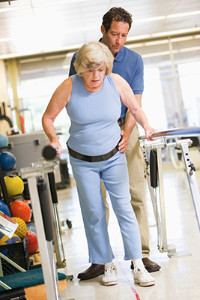 As we get older, our senses and balance begin to wane and the chance of us experiencing a serious fall increases significantly. According to the US Centers for Disease Control and Prevention, falls are the number one cause of fatal injury among older adults and the leading cause for trauma-related hospital admissions. Even more disturbing, every 19 minutes an elderly person dies from a fall. Following the subsequent tips can help prevent falls among the elderly. To start, remove excess clutter and any debris on the floor. Wearing shoes and socks that provide more grip and having skid-proof rugs are a great way to prevent falls. Exercise classes for the elderly can help increase strength and balance; living a sedentary lifestyle and not getting any physical activity actually makes falls more likely. Proper lighting is another key feature that can also help, and automatic night lights can be very useful for illuminating late night trips to the bathroom. Having your eyes and ears checked by a doctor and making sure that your medications do not cause balance loss is vital. Finally, using a cane or walker and installing railings in bathrooms and on both sides of the stairs can provide further support and help prevent falls.
As we get older, our senses and balance begin to wane and the chance of us experiencing a serious fall increases significantly. According to the US Centers for Disease Control and Prevention, falls are the number one cause of fatal injury among older adults and the leading cause for trauma-related hospital admissions. Even more disturbing, every 19 minutes an elderly person dies from a fall. Following the subsequent tips can help prevent falls among the elderly. To start, remove excess clutter and any debris on the floor. Wearing shoes and socks that provide more grip and having skid-proof rugs are a great way to prevent falls. Exercise classes for the elderly can help increase strength and balance; living a sedentary lifestyle and not getting any physical activity actually makes falls more likely. Proper lighting is another key feature that can also help, and automatic night lights can be very useful for illuminating late night trips to the bathroom. Having your eyes and ears checked by a doctor and making sure that your medications do not cause balance loss is vital. Finally, using a cane or walker and installing railings in bathrooms and on both sides of the stairs can provide further support and help prevent falls.
Preventing falls among the elderly is very important. If you are older and have fallen or fear that you are prone to falling, consult with Dr. Mark Gagnon from Advanced Podiatry. Our doctor will assess your condition and provide you with quality advice and care.
Every 11 seconds, an elderly American is being treated in an emergency room for a fall related injury. Falls are the leading cause of head and hip injuries for those 65 and older. Due to decreases in strength, balance, senses, and lack of awareness, elderly persons are very susceptible to falling. Thankfully, there are a number of things older persons can do to prevent falls.
How to Prevent Falls
Some effective methods that older persons can do to prevent falls include:
- Enrolling in strength and balance exercise program to increase balance and strength
- Periodically having your sight and hearing checked
- Discuss any medications you have with a doctor to see if it increases the risk of falling
- Clearing the house of falling hazards and installing devices like grab bars and railings
- Utilizing a walker or cane
- Wearing shoes that provide good support and cushioning
- Talking to family members about falling and increasing awareness
Falling can be a traumatic and embarrassing experience for elderly persons; this can make them less willing to leave the house, and less willing to talk to someone about their fears of falling. Doing such things, however, will increase the likelihood of tripping or losing one’s balance. Knowing the causes of falling and how to prevent them is the best way to mitigate the risk of serious injury.
If you have any questions, please feel free to contact one of our offices located in Crestwood, Orland Park, and Summit, IL . We offer the newest diagnostic and treatment technologies for all your foot care needs.
